While it proved an unusually actor-challenged edition, this year’s Telluride Film Festival did benefit from an especially strong lineup, featuring a clutch of major world premieres as well as significant titles from previous fests like Cannes and Berlin. Our four correspondents watched as much as they could and chose their two favorites.
‘All of Us Strangers’
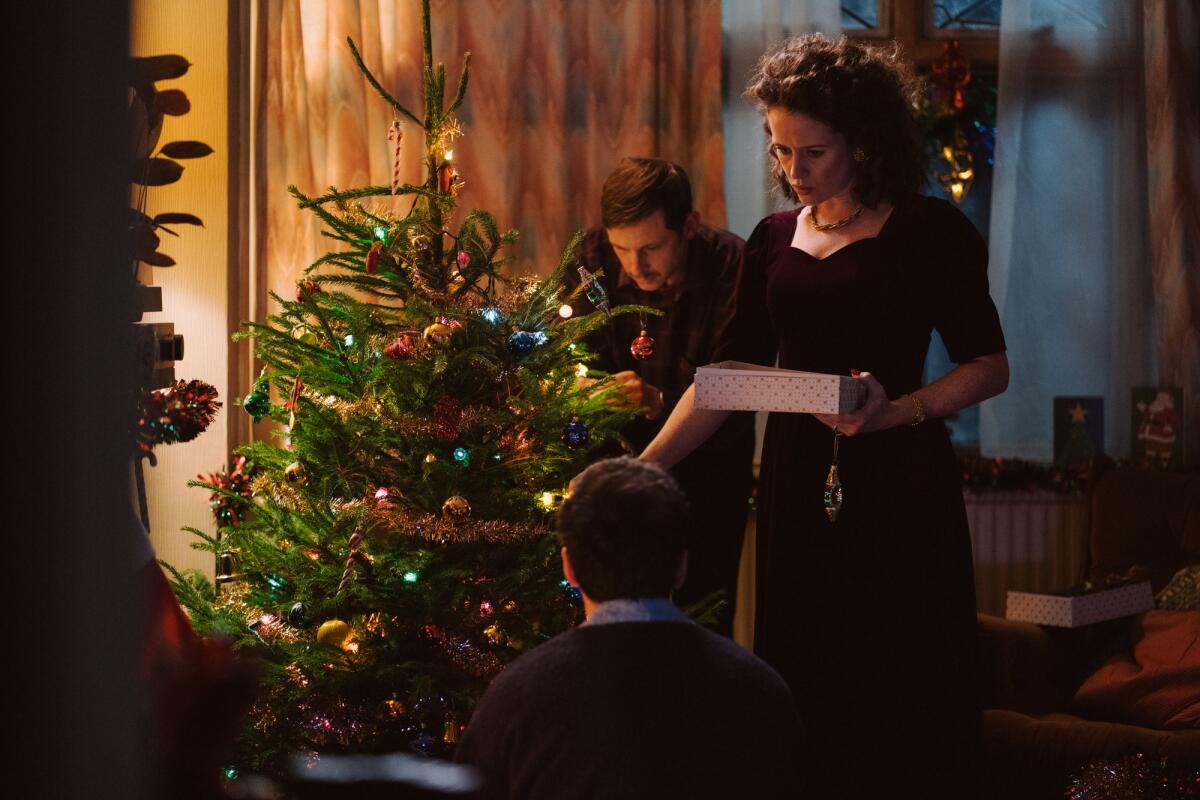
Jamie Bell and Claire Foy in the movie “All of Us Strangers.”
(Chris Harris / Searchlight Pictures)
“All of Us Strangers” begins with Adam (Andrew Scott) leaving his vacant London apartment complex after a fire alarm sounds. He’s the only person on the street. Apparently the building has only one other tenant, Harry (Paul Mescal), a lonely man who shows up at his door later in the evening with a bottle of whiskey and yearning for connection. Adam doesn’t invite him in. He is stuck in the past, still haunted by the deaths of his parents when he was 12. And then, that past comes wonderfully, improbably to life when Harry visits his childhood home and his mom (Claire Foy) and dad (Jamie Bell) open the door, looking just as he last saw them, vibrant and understandably curious about how their son’s life has turned out. What ensues is a profoundly moving story of grief and healing as Adam falls for Harry while achieving an understanding with his parents that wasn’t possible when they were alive. Writer-director Andrew Haigh (“45 Years”) shifts the film’s mood and perspective along the journey, leaving you in a place that feels celestial. You’ll understand when you see it. Just don’t forget to bring some tissues to the theater. — Glenn Whipp
‘Anatomy of a Fall’
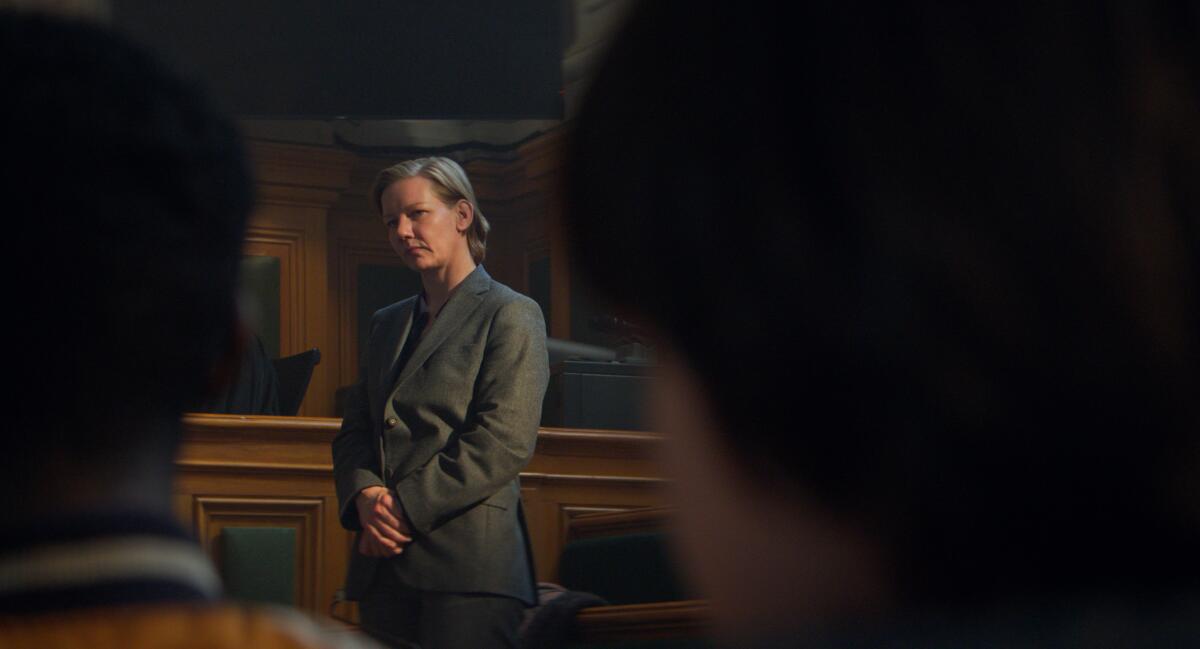
Sandra Hüller in the movie “Anatomy of a Fall.”
(Cannes Film Festival)
Winner of the Palme d’Or at this year’s Cannes Film Festival, director Justine Triet’s “Anatomy of a Fall” appears at first glance to be the latest in a long line of did-they-or-didn’t-they courtroom thrillers familiar to any true-crime aficionado. A well-known writer (Sandra Hüller) is accused of murdering her stay-at-home husband (Samuel Theis) who was found dead after falling (or being pushed) from an open window in their ski chalet. Compounding the mystery, the closest thing to a witness is the couple’s 11-year-old son (Milo Machado Graner), who is blind. While the story carries certain echoes of the Michael Peterson case, dramatized last year in HBO’s “The Staircase,” Triet is less interested in rehashing the conventions of a whodunit than in mapping the emotional fault lines of a modern marriage, and over the course of two-and-a-half riveting hours, a picture gradually emerges of a couple beset by grievances, jealousies and resentments. As gripping as the courtroom scenes are, the movie’s centerpiece is a ferocious argument that instantly joins “Kramer vs. Kramer,” “Shoot the Moon,” “Scenes From a Marriage” and “Marriage Story” in the cinematic pantheon of marital fights. Hüller, who also co-stars in “The Zone of Interest,” delivers a stunning turn that seems certain to put her in awards contention, while Graner brings the film added poignancy as the son whose testimony could either clear his mother’s name or seal her fate. — Josh Rottenberg
‘Fallen Leaves’
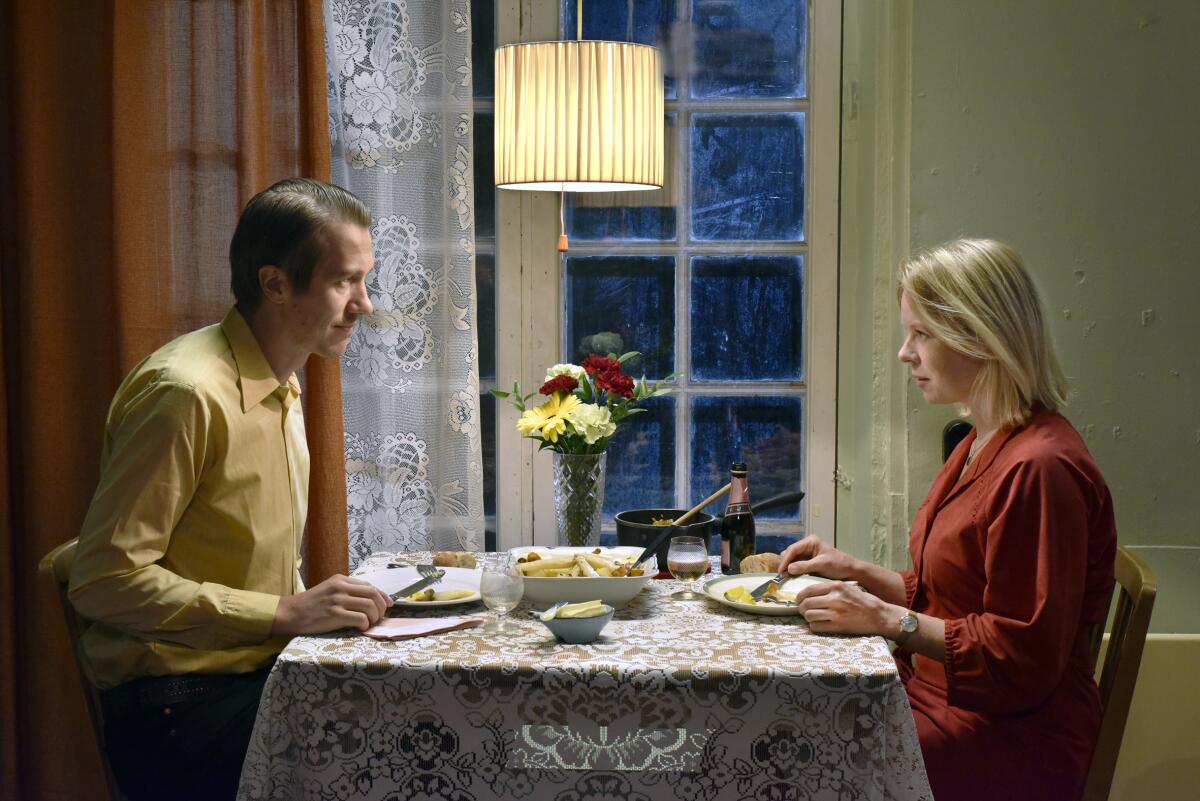
Jussi Vatanen and Alma Pöysti in the movie “Fallen Leaves.”
(Cannes Film Festival)
Actor Jussi Vatanen introduced Aki Kaurismäki’s “Fallen Leaves” as a romantic-comedy seen through the distinct sensibility of this Finnish filmmaking master: “There’s a handshake, a kiss on the cheek and a kiss on the forehead,” he said. “That’s it.” But there’s also a depth of feeling that’s absent from most movies that would be lumped into the romantic-comedy genre, along with some of the funniest deadpan humor I’ve seen in a movie in ages. (Vatanen’s introduction provides a taste of the film’s tone.) “Fallen Leaves” follows two lonely blue-collar workers yearning for something more in life. Holappa (Vatanen) is a hardened construction worker who drinks because he’s depressed — and depressed because he drinks. He meets Ansa (Alma Pöysti) at a karaoke bar. Neither sing — they’re perfect for each other! — and after a couple of other chance meetings, they go on an actual date. The courtship is tentative, halting, sublime. It’s a hopeful film set in a hardened world. You’re going to fall hard for it. — G.W.
‘Janet Planet’
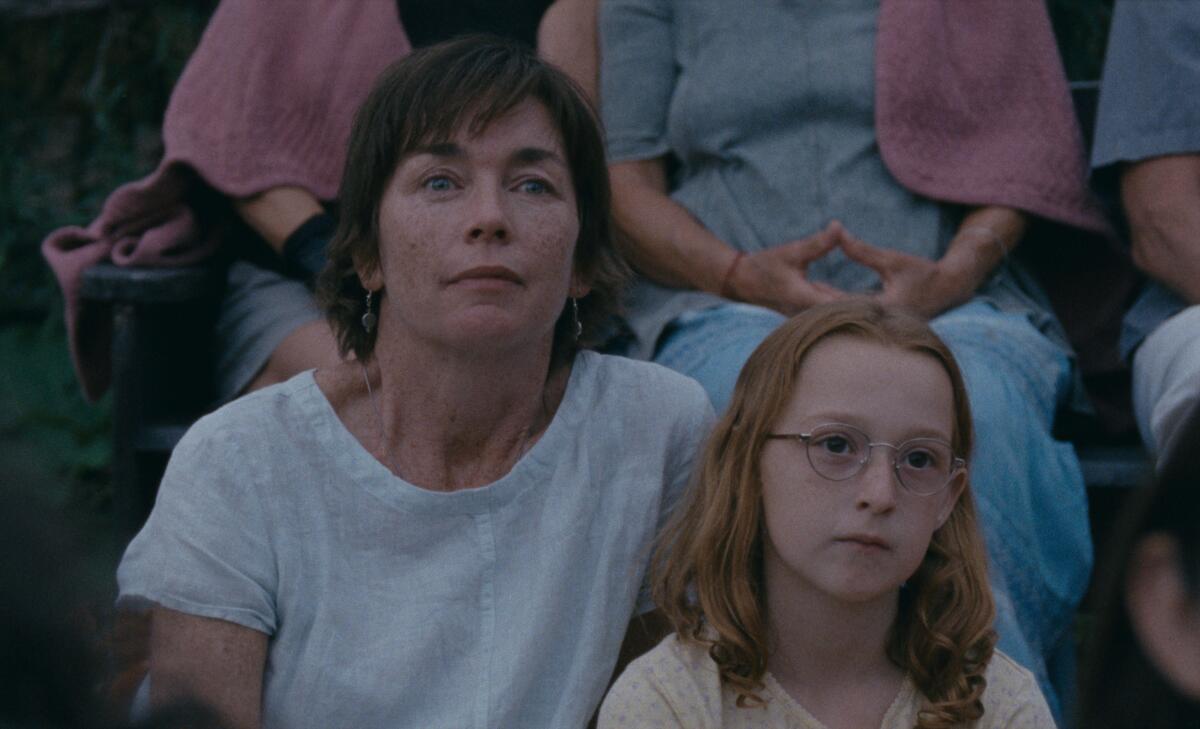
Julianne Nicholson, left, and Zoe Ziegler in the movie “Janet Planet.”
(A24)
It’s been a good year for first features by female playwrights: Sundance brought us Celine Song’s captivating “Past Lives,” and now Telluride has given us “Janet Planet,” an exquisitely intimate debut film from Pulitzer Prize winner Annie Baker (“The Flick,” “The Antipodes”). The festival’s mountainous surroundings can only have enhanced the woodland atmosphere of this exquisitely intimate, refreshingly cliché-averse story, which follows an acupuncturist named Janet (Julianne Nicholson, remarkable) and her 11-year-old daughter, Lacy (newcomer Zoe Ziegler, ditto), over the summer of 1991 in rural Massachusetts. Not much happens and everything happens as mother and child navigate changes in circumstance (Will Patton, Sophie Okonedo and Elias Koteas play some of the other characters drifting in and out of their orbit) and quietly radical shifts in perspective, all of which Baker captures with an unblinking compositional focus as eloquent as her words. — Justin Chang
‘Orlando, My Political Biography’
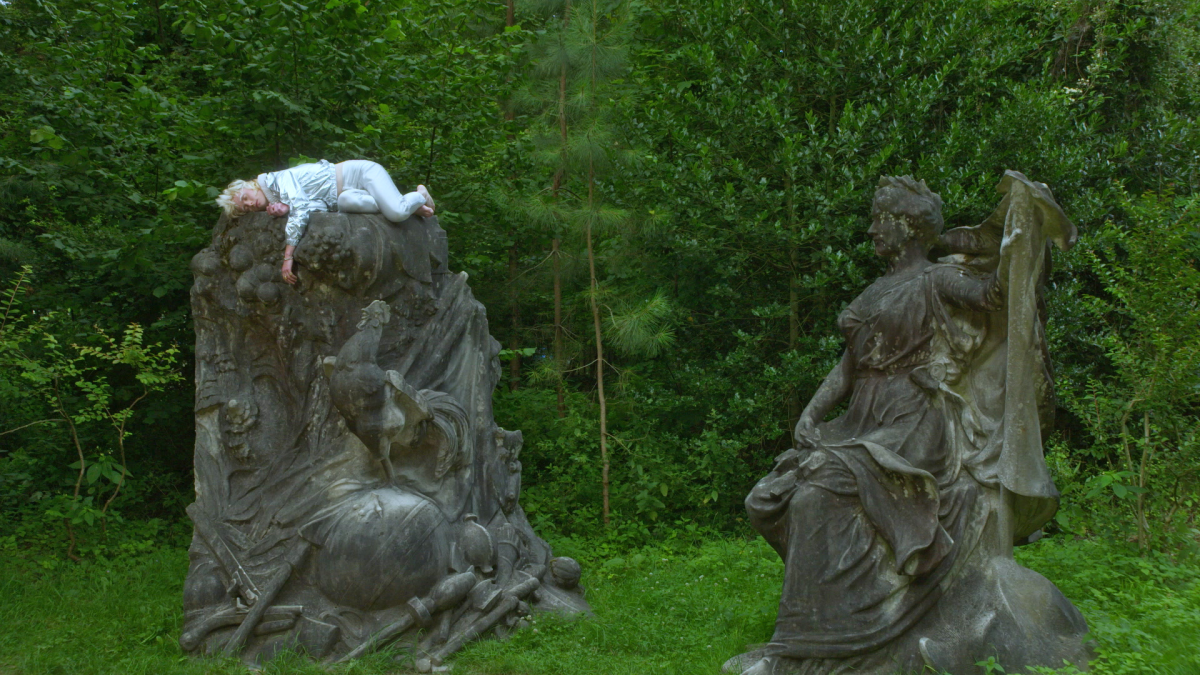
An image from the movie “Orlando, My Political Biography.”
(Sideshow / Janus Films)
Virginia Woolf’s 1928 satire “Orlando: A Biography” was her first big success, the one that allowed her to buy a car and continue writing. But the book, about a poet who changes gender from man to woman, may be paying its greatest dividends now, after decades as an essential feminist and queer text, as a proto-trans statement of purpose. As exfoliated in Paul B. Preciado’s playful and profound cine-essay, Woolf’s narrative explodes into a multiplicity of voices, nonbinary and trans, speaking directly to the camera in an unflinching stream of complex, heartfelt testimony. Preciado, a Spanish philosopher and theorist, clearly has good taste in formal influences: Jean-Luc Godard, the multi-layered investigations of Agnès Varda and Chris Marker. Even so, the film has a vibe all its own, as well as a wonderful costuming choice — a crimped ruff collar — that confers on all 26 onscreen Orlandos a dignity that society itself is too stingy to offer. Screw society, though; the spirit here is bold, confident and, ultimately, exhilarating. — Joshua Rothkopf
‘Poor Things’

Ramy Youssef, rear, and Emma Stone in the movie “Poor Things.”
(Searchlight Pictures)
Instant rapture was the consensus — and why not? “Poor Things” contains pleasures all but abandoned by today’s mainstream: an exuberant, explicit lustiness that would make Ken Russell blush; uninhibited production design liberated from historical accuracy (it’s the topology of a pink-hued dream); a score by Jerskin Fendrix that sounds like a strangled harpsichord, harking back to the genius flights of Ennio Morricone. Paradoxically, though, the film (imagine “Frankenstein” as a sexual odyssey across a fantasy Europe) is a celebration of the oldest convention in movies: an inspired director and a fearless actor. Here, the former is Greece’s Yorgos Lanthimos, leaping into a genre of his own, and the latter is Emma Stone, proving herself so much more than the favourite. Bella, Stone’s feral creation, will enter the pantheon of classic characters, claiming knowledge and identity with every scene and gesture. — J. Rothkopf
‘Tótem’
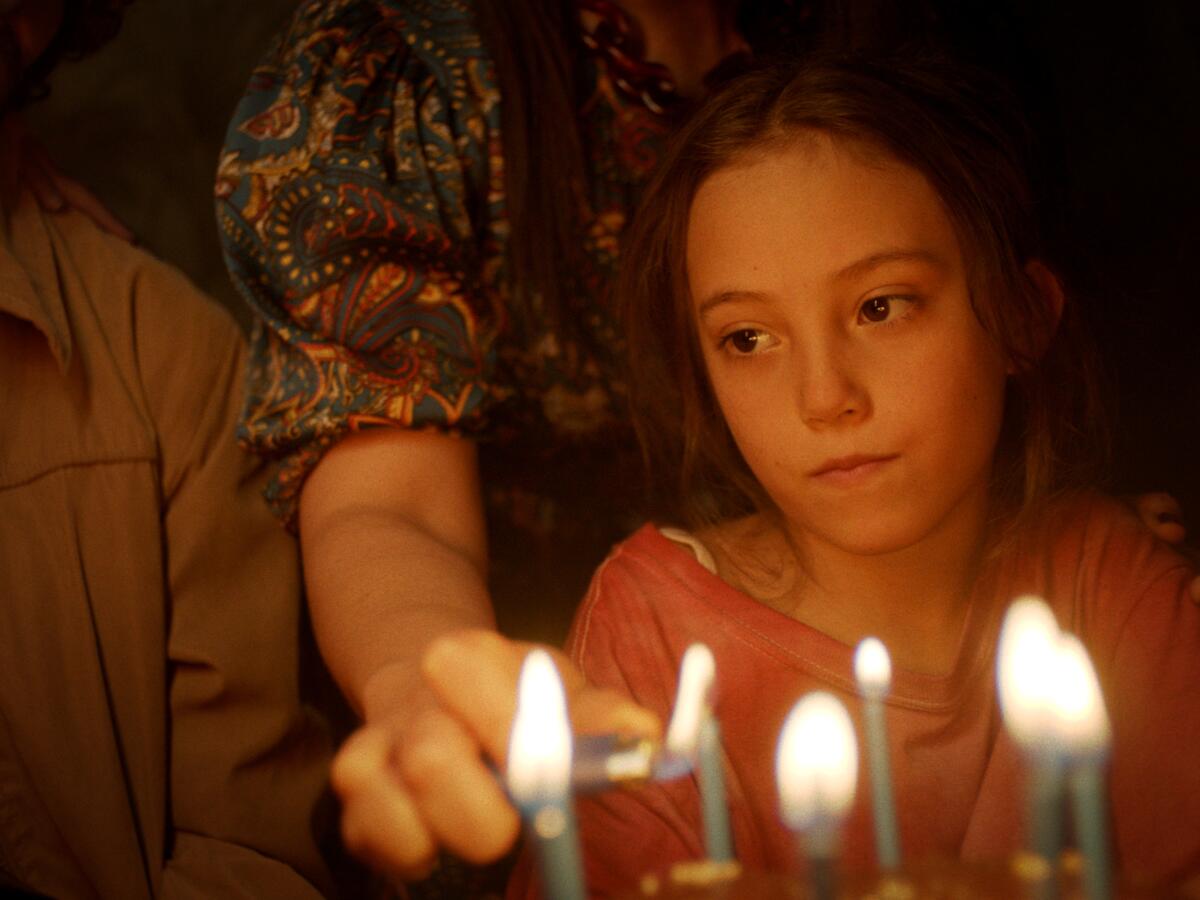
Naíma Sentíes in the movie “Tótem.”
(Sideshow / Janus Films)
A highlight of the 2023 Berlin International Film Festival competition and a shortlisted candidate for Mexico’s Oscar submission, this exquisite, emotionally overwhelming drama is tellingly bookended by closeups of a 7-year-old girl named Sol (the wonderful Naíma Sentíes). In between those two images — one full of joy, the other suffused with sorrow — the gifted writer-director Lila Avilés (“The Chambermaid”) unfolds the story of a teeming, hurting, hilarious and resilient clan coming together to bid one of its members a heartbreaking farewell. Terminal illness and fractious families are hardly new topics in world cinema, but so achingly assured is Avilés’ grasp of character and narrative, so attuned is her handheld camera to nuances of perspective, setting and atmosphere, that she pulls you into the action with a depth and force of feeling that eludes some of her more veteran peers. — J.C.
‘The Zone of Interest’
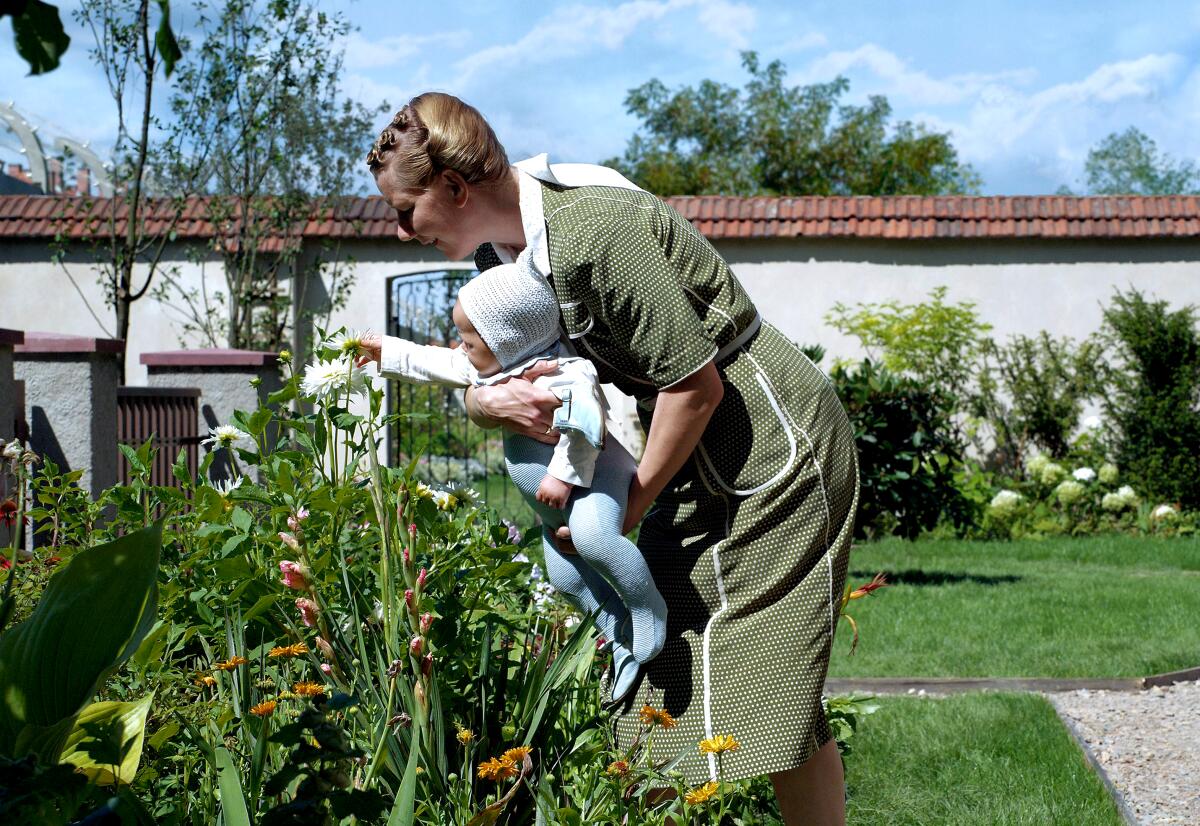
Sandra Hüller in the movie “The Zone of Interest.”
(A24)
Telluride audiences often tend to favor feel-good fare (“Nyad” had them cheering this year), and it’s hard to imagine a more profoundly feel-bad film than director Jonathan Glazer’s chillingly clinical examination of the banality of evil. Yet from its first screening onward, the German-language “Zone” became one of this year’s word-of-mouth must-sees. A Holocaust film like no other, “Zone” follows Nazi SS officer Rudolf Höss (Christian Friedel), longest-serving camp commandant of Auschwitz, and his wife Hedwig (Sandra Hüller) as they attempt to build an idyllic domestic life for their family just outside the concentration camp’s walls. The horrors of Auschwitz are never shown on screen and are spoken of only as logistical problems to be managed — among other things, this is a film about the soul-destroying power of denial, compartmentalization and euphemism. But gunshots, screams and the din of the camp’s industrial machinery of death provide the background hum for the couple and their children as they go about the generally mundane business of their lives: hosting parties, playing with toy soldiers, tending the garden. Cinema usually likes its villains big and scary, not mundane and dull. That may be why the film’s naturalistic, unsentimentalized depiction of Höss feels so radical — and so stomach-turning. For Glazer, evil comes not in the form of larger-than-life world-historical figures but as a ladder-climbing middle manager who goes home after a day of overseeing mass extermination and reads his kids bedtime stories, while his shallow wife casually tries on the clothes of the recently murdered to see if any look good on her. “Zone” left me speechless at the end. Now all I want to do is talk about it. If that’s not the sign of a great movie, I don’t know what is. — J. Rottenberg



